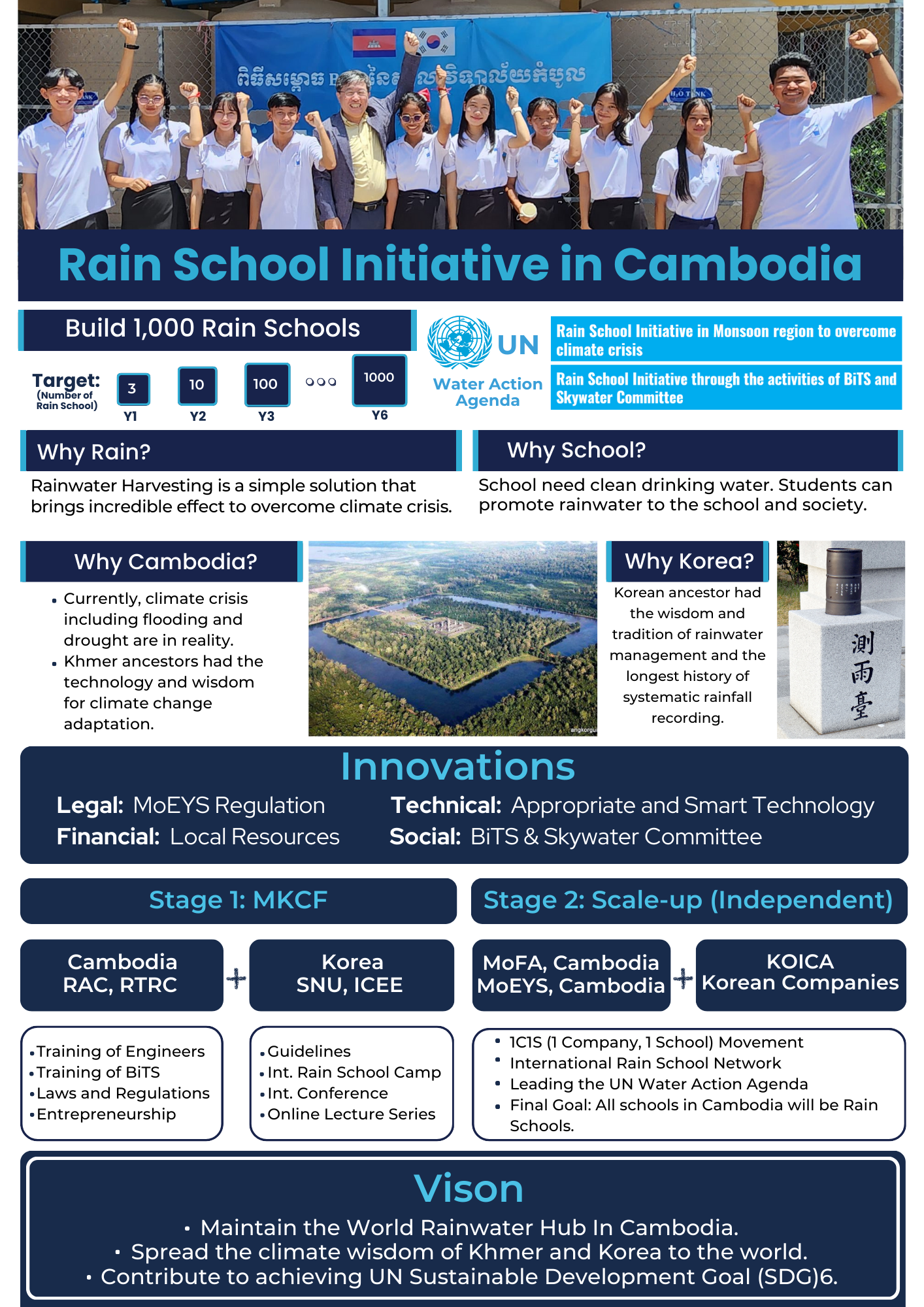Progress report for
Rain School Initiative in Monsoon region to overcome climate crisis

Achievement at a glance
Droughts and floods occur due to the characteristics of the monsoon region, and each region has its traditions. In the monsoon region, rainwater harvesting is of utmost importance. A shift in public perception is needed, and education of students in schools is particularly crucial. Five Rain Schools have been established with support from MI and are currently operational. A 20-ton rainwater drinking facility has been constructed to provide drinking water. The student group BiTs was formed to maintain the facility and spread knowledge of rainwater to the school and the community.At the UN 2023 Water Conference Side Event, global Rain School activities were presented. Students from several countries participated in and shared dances using sign language to foster enjoyable interaction and mutual understanding. An article about Rain Schools was published in Source, the International Water Association (IWA) magazine, introducing these schools to water professionals.
A Rain School Camp was hosted in South Korea to bring together teachers and students from various countries, and this camp will continue in the future. The 33-minute video "Do You Know BiTs?" documents Rain School activities and captures the camaraderie between Korean and Vietnamese students and their families, aiming for future collaboration.
By focusing on local activities and considering regional traditions and culture, students can independently address water and drinking water issues, which will be a significant game-changer in climate change adaptation.
Challenges faced in implementation
In the monsoon region, rainwater has traditionally been used, but there is a lack of awareness and technical expertise. Misconceptions about rainwater arise due to inadequate water quality management, dry season water shortages, a lack of good design examples, and the perception that maintenance is difficult. Consequently, in developed countries, rainwater is often viewed as something to be discarded, while countries like Germany and Japan use it only for non-potable purposes. Due to the scarcity of positive examples, most policymakers and scholars assume that rainwater is only used as a last resort by the poor.This challenge was tackled by showcasing the creative local culture and historical facts. Monsoon region countries often experience droughts and floods, and their ancestors developed valuable wisdom to address these issues. Emphasizing this knowledge instilled pride in students and engineers. They were reminded that the Khmer ancestors in Cambodia prioritized rainwater management while constructing cities like Angkor Wat. Similarly, King Sejong of Korea invented the world's first rain gauge in 1441, enabling rainfall records to be kept ever since.
Recognizing that the ancestors of the monsoon region were, in fact, experts in climate crisis adaptation inspired and motivated many.
Through relatively simple training and education, as well as sharing best practices, Cambodia and Korea have positioned themselves as places where people should come to learn about rainwater training and education. The proposal to achieve sustainable operations for the center includes partnering with international organizations like the UN, WHO, and UNICEF to provide contracted training.
Next Steps
Mooyoung HanBeneficiaries
The primary beneficiaries are the students at the school. At each Rain School, approximately 500 students who would otherwise drink contaminated water or purchase bottled water can receive one liter of clean water daily. This also helps schools reduce the costs associated with water supply.
Students who learn here will be reminded of revolutionary ideas about rainwater and understand its importance. They will implement rainwater management practices within their communities. These insights will be shared among educators and engineers in several Mekong countries to change policies, empowering regions to solve local issues independently.
The indirect beneficiaries are all community members. By changing perceptions about rainwater and incorporating technical and creative social methods, this initiative will become a game-changer in solving water issues for many people in the world.
Actions
Established five fully functioning Rain Schools across the Mekong region, made possible through financial support from the MKCF, creating educational hubs that provide essential water management training and resources.Hosted an International Rain School Camp that gathered students and educators worldwide, offering collaborative workshops and seminars to foster innovative rainwater management solutions.
Arranged a side event at the UN 2023 Water Conference, bringing together global stakeholders to discuss rainwater management's pivotal role and explore strategies for broader implementation.
Successfully advocated for the Royal Academy of Cambodia to create the Rainwater Training and Research Center, a facility designed to offer specialized training and research in rainwater management.
Persuaded MoEYS to incorporate Rain Schools into government policy, fostering broader support for integrating rainwater management education into the national curriculum.
We produced a documentary, “Do you know BiTS,” that captured the Rain School Initiative's activities and the strong bonds formed among participants. The documentary highlighted its global impact on rainwater awareness and cooperation.
https://youtu.be/_hdaAOb1YYo
